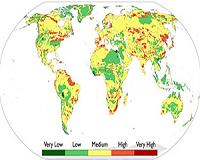| . |  |
. |
Bonn (AFP) June 11, 2010 Saudi Arabia on Thursday blocked a call by vulnerable island states at climate talks for a study into the impact of 1.5 degrees Celsius (2.7 degrees Fahrenheit) of global warming, delegates said. The appeal came from the Association of Small Island States (AOSIS), gathering low-lying islands in the Caribbean, Indian Ocean and the Pacific, which is lobbying hard for the UN climate arena not to abandon the 1.5 C target. The goal is receding as emissions of greenhouse gases rise and political problems for tackling climate change multiply. AOSIS, supported by the European Union (EU), Australia and New Zealand, called for a technical report on the cost of reaching the 1.5 C target and the consequences of breaching it. But it was thwarted by Saudi Arabia, with support from Kuwait and Qatar, under the UN's consensus rule, the sources said. Saudi Arabia and other major oil producers argue that ratcheting up action on carbon emissions will hurt their revenues as fossil-fuel consumers switch to cleaner energy. The spat soured the mood in Bonn, where a 12-day round under the 194-nation UN Framework Convention on Climate Change (UNFCCC) draws to a close on Friday. "The atmosphere [in the meeting] was very bad. Many countries said they were very disappointed with the Saudis," said one source. "Some small island states could become stateless from sea level rise, which is why they are calling for global temperature rise to be kept below 1.5 C," added Wendel Trio of Greenpeace. "That Saudi Arabia, a country with such obvious oil interests, exploited the UN consensus rule to stop the world's most vulnerable countries from getting a much-needed summary of the latest climate science is breathtaking for its criminal disregard for the human impacts of climate change." The UNFCCC is tasked with shepherding the world's nations to a new treaty on climate change that would take effect from 2012. But the arena is still struggling to recover from a bust-up in Copenhagen last December. Under a last-minute deal, a small group of leaders set a target of limiting warming to 2 C (3.6 F) through voluntary actions. Their document, the Copenhagen Accord, has been backed by around two-thirds of the UNFCCC's 194 parties. Two more rounds of UNFCCC negotiations are taking place before a major conference in Cancun, Mexico, from November 29 to December 10. Few delegates hold out hopes that the Cancun meeting will deliver the much-promised climate pact that eluded the Copenhagen summit. Instead, the most favourable scenario is to seal the treaty at the end of 2011, in South Africa. Meanwhile, a paper released on the sidelines of the Bonn talks warned that the world was heading towards 3 C (5.4 F) of warming by 2100 on the basis of the Copenhagen pledges and other policies. "The current pledges and loopholes give us a virtual certainty of exceeding 1.5 C (2.7 F), with global warming very likely exceeding 2 C (3.6 F) and a more than 50-percent chance of exceeding 3 C (5.4 F) by 2100," said Bill Hare of Germany's Potsdam Institute for Climate Impact Research (PIK).
Share This Article With Planet Earth
Related Links Climate Science News - Modeling, Mitigation Adaptation
 Climate Change Leading To Major Vegetation Shifts Around The World
Climate Change Leading To Major Vegetation Shifts Around The WorldBerkeley CA (SPX) Jun 10, 2010 Vegetation around the world is on the move, and climate change is the culprit, according to a new analysis of global vegetation shifts led by a University of California, Berkeley, ecologist in collaboration with researchers from the U.S. Department of Agriculture Forest Service. In a paper published in the journal Global Ecology and Biogeography, researchers present evidence that over the ... read more |
|
| The content herein, unless otherwise known to be public domain, are Copyright 1995-2010 - SpaceDaily. AFP and UPI Wire Stories are copyright Agence France-Presse and United Press International. ESA Portal Reports are copyright European Space Agency. All NASA sourced material is public domain. Additional copyrights may apply in whole or part to other bona fide parties. Advertising does not imply endorsement,agreement or approval of any opinions, statements or information provided by SpaceDaily on any Web page published or hosted by SpaceDaily. Privacy Statement |